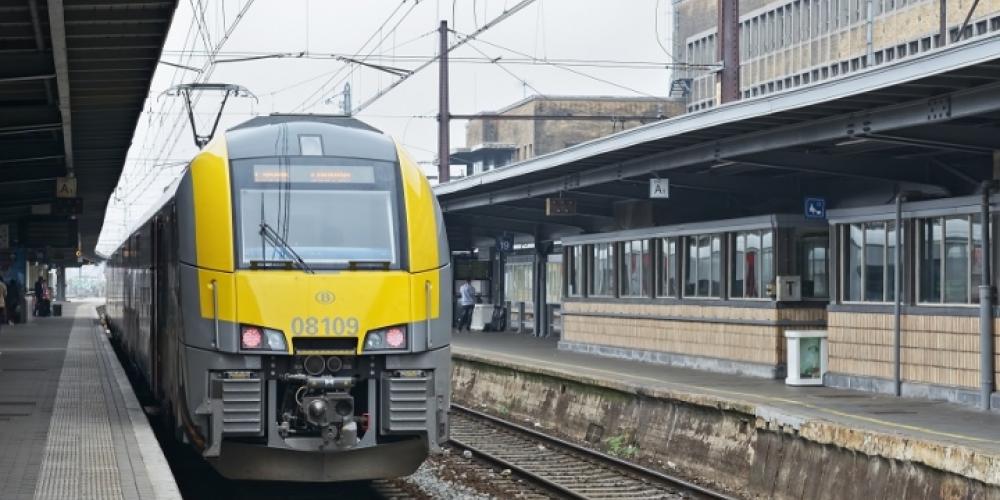
In 2013 roughly 16% of all VUB flights, of which the destination is known, were transfers within a 750km radius. Even one in three trips to London were flights. It shouldn’t come as a surprise then that a baseline measurement of our Carbon Footprint in 2016 showed that aside from energy use (claiming 27%), mobility and commuting together were responsible for a whopping 55% of the total 34.869 ton CO2-equivalent emissions.
The past few years, several researchers already took matters into their own hands and undertook the initiative to reduce their CO2 footprints. These bottom-up initiatives showed there was a demand for clear regulations at an organizational level. In November 2017 the point was raised during a discussion on ‘Sustainable Tuesday’ and students and staff cleared the way for a new work travel policy. That trajectory resulted in the approval of the ABC-principle by the Academic Board on January 21st and the Board of Directors on January 29th.
The ABC-principle: the 3 pillars of the travel policy
The travel policy is applicable to all work related trips by VUB staff, its students, researchers and guests and is based on three pillars:
AVOID | Don’t travel if not strictly necessary
Vrije Universiteit Brussel stimulates its staff to plan work trips with due consideration. VUB will therefore invest in sensibilisation about technological alternatives for virtual collaboration and will organise workshops and conferences with a lower environmental impact, e.g. through ‘Skype of Business’ and video conferencing.
BOOK AN ALTERNATIVE | Travel by train
When train travel from Brussels-Midi takes less than 6 hours, this mode of transportation becomes the default choice. VUB presents a city list with an overview of destinations that are always available through train travel. The city list is also applicable to parts of work trips that require a stop-over, more specifically on transport to airports that can be reached in less than 6 hours. Air travel to these destinations will exceptionally be allowed following an acceptable motivation and clearance from a superior staff member. In the case where train travel from Brussels-Midi takes between 6 and 8 hours this option is still highly recommended. That is why the city list also includes these destinations with preferred train travel.
COMPENSATE | CO2-compensation of emissions through air travel
For air travel in light of a VUB assignment or project a default contribution to compensate for the emissions of greenhouse gases will be added to the travel cost. These compensation contributions will only benefit certified climate projects, with climate credits rendered per effectively reduced ton of CO2. VUB has committed to that in its specifications for a framework agreement for work travel so that all travel agencies can calculate the emissions and compensation following the same methodology. Based on the actually issued compensation certificates the quality and authenticity of compensation projects will be verified.
From policy to implementation
Now that travel policy has been approved, VUB is undertaking the necessary steps for the practical implementation and actively informing all stakeholders.
The VUB Sustainability core group which operates under supervision of the VUB Sustainability Board is preparing a request for offer for the framework agreement for VUB work travel in close cooperation with the VUB Finance Department. As soon as the framework agreement becomes active, a phasing-in period will come into action. During this phasing-in period flying to shorter destinations will be possible upon explicit request and motivation. Compensating for your CO2 emissions will already be available too.
The winning tenderers of the framework agreement will take care of booking work travel and will be the liaison between VUB staff members and airlines, compensation platforms, international rail operators, visa agencies. They will be responsible for the enforcement of the work travel policy for any trip booked within the framework. This ensures administrative simplification at the same time. Obviously nothing inhibits students and staff to already travel by train now.
Furthermore, measuring the success of the travel policy can be meticulously tracked through the emissions data generated through the framework agreement. The Sustainability Core Group of Vrije Universiteit Brussel will account for the monitoring of the successful compliance of the ABC-principals by the tenderers.
Do you have questions concerning the travel policy at VUB? Would you like to organise an information session in your faculty or research group? Please contact duurzaamheidsraad@vub.be.
Read more
About the sustainability policy of VUB
In 2013 waren 16% van de vluchten, waarvan de bestemming gekend is, verplaatsingen binnen een straal van 750 km. Ook één op drie verplaatsingen naar London gebeurde met het vliegtuig. Het mag dan ook niet verbazen dat uit de nulmeting van de Carbon Footprint van de VUB uit 2016 bleek dat naast het energieverbruik (goed voor 27%), mobiliteit en woon-werk-verkeer samen verantwoordelijk zijn voor 55% van onze in totaal 34.869 ton CO2-equivalente uitstoot.